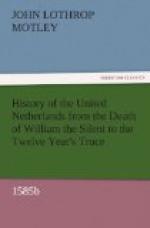Parma had become really gentle, almost affectionate, towards the Netherlanders. He had not the disposition of an Alva to smite and to blast, to exterminate the rebels and heretics with fire and sword, with the axe, the rack, and the gallows. Provided they would renounce the great object of the contest, he seemed really desirous that they should escape further chastisement; but to admit the worship of God according to the reformed creed, was with him an inconceivable idea. To do so was both unrighteous and impolitic. He had been brought up to believe that mankind could be saved from eternal perdition only by believing in the infallibility of the Bishop of Rome; that the only keys to eternal paradise were in the hands of St. Peter’s representative. Moreover, he instinctively felt that within this religious liberty which the Netherlanders claimed was hidden the germ of civil liberty; and though no bigger than a grain of mustard-seed, it was necessary to destroy it at once; for of course the idea of civil liberty could not enter the brain of the brilliant general of Philip II.
On the 13th of November he addressed a letter to the magistracy and broad-council of Antwerp. He asserted that the instigators of the rebellion were not seeking to further the common weal, but their own private ends. Especially had this been the ruling motive with the prince of Orange and the Duke of Anjou, both of whom God had removed from the world, in order to manifest to the States their own weakness, and the omnipotence of Philip, whose, prosperity the Lord was constantly increasing. It was now more than time for the authorities of the country to have regard for themselves, and for the miseries of the poor people. The affection Which he had always felt for the Provinces from which he had himself sprung and the favours which he had received from them in his youth, had often moved him to propose measures, which, before God and his conscience, he believed adequate to the restoration of peace. But his letters had been concealed or falsely interpreted by the late Prince of Orange, who had sought nothing but to spread desolation over the land, and to shed the blood of the innocent. He now wrote once more, and for the last time, in all fervour and earnestness, to implore them to take compassion on their own wives and children and forlorn fatherland, to turn their eyes backward on the peace and prosperity which they had formerly enjoyed when obedient to his Majesty, and to cast a glance around them upon the miseries which were so universal since the rebellion. He exhorted them to close their ears to the insidious tongues of those who were leading them into delusion as to the benevolence and paternal sweetness of their natural lord and master, which were even now so boundless that he did not hesitate once more to offer them his entire forgiveness. If they chose to negotiate, they would find everything granted that with right and reason could be proposed. The Prince concluded by declaring that he made these advances not from any doubt as to the successful issue of the military operations in which he was engaged, but simply out of paternal anxiety for the happiness of the Provinces. Did they remain obstinate, their ultimate conditions would be rendered still more severe, and themselves, not he, would be responsible for the misery and the bloodshed to ensue.




